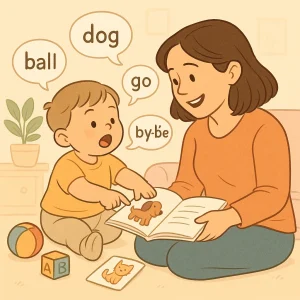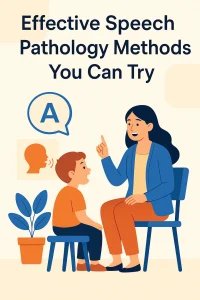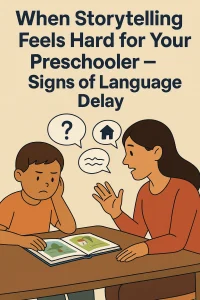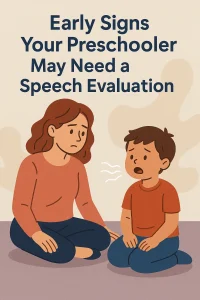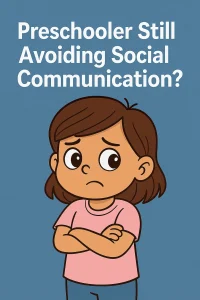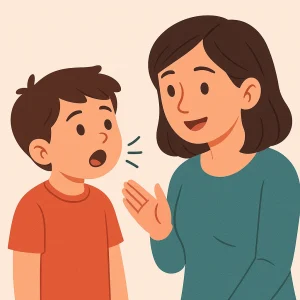Can Poor Articulation Affect My Child’s Reading and Writing?
By Rajini D
Last Updated: January 15, 2025
Articulation the way children form sounds and words is essential for clear communication and literacy development. When articulation issues arise, their impact on literacy extends beyond speech, affecting critical reading and writing skills necessary for academic success. Understanding this connection is vital, as early intervention can significantly enhance a child’s learning experience. This overview explores the articulation impact on literacy and outlines steps to support children facing these challenges, ensuring they have the tools to succeed academically.
Understanding Articulation and Its Role in Literacy
What Is Articulation?
Articulation is how we make speech sounds using our mouth, lips, and tongue. It’s crucial for kids as they learn to talk clearly. When children can pronounce words correctly, it not only helps them communicate better and boosts their confidence but also has a significant articulation impact on literacy. This proficiency in articulation supports their ability to read and write effectively, reinforcing their overall academic development.
Common issues in articulation for children include:
- Phonological disorders: These involve trouble understanding how to form sounds into words.
- Articulation disorders: These are difficulties in making sounds correctly, like saying “wabbit” for “rabbit.”
- Childhood Apraxia of Speech: This is when kids find it hard to make the correct mouth movements to speak, even though their muscles are fine.
Overview of Common Articulation Disorders
| Disorder | Description | Common Signs |
|---|---|---|
| Phonological Disorders | Difficulties with the sound rules of language leading to systematic sound errors. | Substituting one sound for another, like “w” for “r”. |
| Articulation Disorders | Problems making sounds correctly; issues with physical production of sounds. | Mispronouncing sounds, like saying “wabbit” for “rabbit”. |
| Childhood Apraxia of Speech | Neurological disorder affecting the planning of speech movements. | Inconsistent speech, difficulty imitating sounds. |
The Link Between Articulation and Literacy
Good articulation is essential for reading and writing because it helps kids connect sounds to letters. If a child has trouble with articulation, they might also struggle to read and write properly. This articulation impact on literacy occurs because they can’t match the sounds they hear to the letters they see.
Impact of Poor Articulation on Reading Skills
Articulation’s Influence on Reading Accuracy
Kids who have trouble pronouncing words often find reading challenging too. This is because reading well means being able to recognize and say the sounds that make up words. For instance, a child who mixes up the sounds for “b” and “d” might read “bed” as “deb.” These kinds of mistakes can make reading hard and less enjoyable.
The Long-Term Effects on Reading Comprehension
Being able to speak clearly is also linked to understanding what you read. Children who articulate well tend to have an easier time understanding stories and information they read. This is because good communication skills help them think about and discuss what they read, which boosts their learning and memory.
Impact of Poor Articulation on Writing Skills
Challenges in Written Expression Due to Poor Speech
Kids who don’t speak clearly often face trouble when it comes to writing. If they mispronounce words, they might also spell them wrongly. This can make their writing confusing and full of mistakes.
Strategies to Improve Writing Through Better Articulation
Parents can help their kids get better at both speaking and writing with a few simple activities:
- Read Aloud: Have your child read books out loud. This helps them hear the proper sounds of words, which can improve their spelling and writing.
- Use Speech-to-Text Tools: Let your child use speech-to-text software to speak their ideas before seeing them written down. It’s a fun way to learn correct spelling and grammar.
- Play Pronunciation Games: Try games that focus on saying words clearly, like saying tongue twisters or doing fun speech challenges.
- Keep a Shared Journal: Start a journal where you and your child write notes to each other. This can help them practice writing and lets you gently correct any mistakes.
- Get Professional Help: If speech issues continue, it might be helpful to see a speech therapist. Wellness Hub offers programs that tackle both speech and writing problems, helping your child do better in school.
Also read: 6 Amazing Children’s Books for Speech and Language Growth
How Therapy Can Help
Speech Therapy Techniques for Improving Articulation
Effective speech therapy is key to helping children overcome articulation issues. Therapists use a variety of methods tailored to each child’s needs, making it easier for them to pronounce words correctly and thereby improve their communication skills overall. Some common techniques include: This focus on articulation impact on literacy is crucial for enhancing their reading and writing abilities.
- Auditory Bombardment: Listening to words pronounced correctly multiple times to help children learn the right sounds.
- Phonetic Placement: Teaching children how to place their tongue, lips, and jaw to make sounds correctly.
- Sound Repetition: Practicing specific sounds over and over to build muscle memory and confidence.
- Interactive Games: Using games and activities that make therapy fun and engaging, helping children learn without feeling like they are in a traditional learning environment.
The Role of Speech Therapists and Parents
Collaboration between speech therapists and parents is crucial in maximizing the effectiveness of therapy. Parents play a vital role in reinforcing what children learn during therapy sessions. Here’s how teamwork enhances outcomes:
- Consistency: Therapists provide guidance and exercises to practice at home, which parents can help implement, ensuring skills are practiced consistently.
- Support: Emotional and motivational support from parents can greatly increase a child’s progress. Celebrating small victories encourages children and keeps them engaged.
- Adaptation: Parents can provide valuable feedback to therapists about what works and what doesn’t, helping to tailor the approach to the child’s specific needs.
Conclusion
Clear speech is key to good reading and writing. If your child struggles with articulation, it can affect their school performance and confidence. Early help makes a big difference. At Wellness Hub, we offer speech therapy that helps improve speaking, reading, and writing skills. If you’re worried about your child’s speech or literacy, don’t wait to get help. Our experts are here to support your child’s journey to better communication and academic success.
Frequently Asked Questions:
1. What is articulation in children?
Articulation refers to how children use their mouth, lips, and tongue to produce speech sounds. Proper articulation is crucial for clear and effective communication. Issues with articulation can mean a child struggles to make certain sounds correctly, which can impact their ability to communicate clearly with others.
2. How does poor articulation affect my child’s reading?
Poor articulation can lead to difficulties in reading because it directly affects phonemic awareness—the ability to hear and manipulate sounds in words. If a child cannot pronounce sounds accurately, they may also have trouble recognizing these sounds when reading, leading to challenges in decoding words.
3. Can articulation problems impact writing skills?
Yes, children who struggle with articulation often have difficulties in writing as well. If they cannot say words correctly, they may not know how to spell them, leading to errors and frustration in writing tasks. This can affect their academic performance and their confidence.
4. What are common signs of articulation issues in children?
Common signs include consistently mispronouncing words, omitting sounds in words, and difficulties making certain sounds (like “s” or “r”). These issues might be more noticeable when a child is under pressure or trying to speak quickly.
5. When should I seek help for my child’s speech issues?
If you notice your child frequently struggles with making certain sounds, or if their teacher has mentioned concerns about their speech clarity or literacy skills, it’s wise to consult a speech therapist. Early intervention can significantly improve outcomes.
6. What does speech therapy for children involve?
Speech therapy may involve various techniques tailored to the child’s specific needs, such as exercises to strengthen the muscles used in speech, practice with sound production, and games that make learning fun. Therapists also often work on language skills alongside articulation to support overall communication abilities.
7. How can I help my child with articulation at home?
Support your child at home by reading together daily, practicing pronunciation of tricky sounds, engaging in conversations, and using technology like speech-to-text software to make learning interactive. Consistency and encouragement are key.
8. What benefits does early speech therapy offer?
Early speech therapy can help prevent more severe communication difficulties later on. It helps improve both academic and social skills by ensuring that children can speak clearly and interact effectively with their peers and teachers.
9. Can speech therapy help if my child has already started school?
Absolutely! Speech therapy is effective for children of all ages. Starting therapy after a child has begun school can still bring significant improvements in speech clarity, literacy, and overall academic performance.
10. Where can I find resources or support for speech therapy?
You can visit the Wellness Hub website at Wellness Hub’s speech therapy services for access to a range of professional support options, including personalized therapy plans and educational resources tailored to meet your child’s specific needs.
About the Author:
Rajini Darugupally
M.Sc., Speech-Language Pathologist (9+ years of experience)
Rajini is a passionate and dedicated Speech-Language Pathologist with over 9+ years of experience, specializing in both developmental speech and language disorders in children and rehabilitation in adults. Currently, at Wellness Hub, she thrives in a team environment that values innovation, compassion, and achieving results for their clients.
Book your Free Consultation Today
Parent/Caregiver Info:
Client’s Details:
* Error Message


